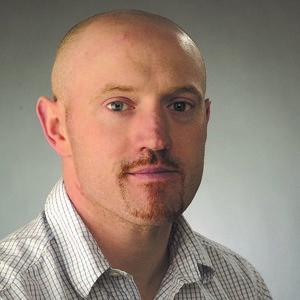
Credit: Syracuse University
Syracuse, N.Y. – Syracuse University chemistry professor Dr. Robert P. Doyle has developed a new drug lead to treat type 2 diabetes in millions of patients who are seeking to better control their blood sugar without the common side effects of nausea, vomiting, and in select cases, undesired weight loss.
Doyle’s research article, “Corrination of a GLP-1 Receptor Agonist for Glycemic Control without Emesis,” was published recently in the peer-reviewed scientific journal Cell Reports.
A common group of drugs used to treat type 2 diabetes are glucagon-like peptide-1 receptor (GLP-1R) agonists. While they do lower blood sugar levels in diabetic patients, their side effects include nausea, vomiting, and weight loss.
Through grants from the National Institutes of Health (NIH), Doyle and his collaborators found a way to combine two molecules into a new substance that lowers blood sugar without those undesired side effects.
In technical terms, Doyle’s team developed a new area of bioconjugation, a chemical technique used to combine two molecules. By binding together exendin-4 (Ex4), an FDA-approved GLP-1R agonist, to dicyanocobinamide (Cbi), which is a small piece of the complex vitamin B12 molecule, they produced Cbi-Ex4 in a technique they call “corrination” – a play, of course, on “coronation.”
Data collected from testing Cbi-Ex4 in the musk shrew (Suncus murinus) – the mammal used in this study due to its ability to vomit (rodents and many mammals lack that ability) – revealed beneficial effects as evidenced by improved blood sugar levels during glucose tolerance tests and a profound reduction in vomiting compared to Ex4. Importantly, no weight loss was noted, again in stark contrast to the currently approved GLP-1R agonist, making this new drug ideal for patients who require glucoregulation without affecting their body mass index (BMI) levels.
This drug could therefore benefit diabetes patients who also live with cystic fibrosis, COPD, sarcopenia, cancer, or HIV, where weight-loss is counter-indicated.
The next step in the development of this groundbreaking drug is to move it through the pre-clinical phase into phase I human studies. Doyle and his team have submitted a new grant proposal to the NIH to fund this effort.
Alongside this work, Doyle has also been awarded a three-year, $3 million grant through the federal Department of Defense (DoD) to help military veterans with comorbid diabetes and obesity. Nearly 25 percent of veterans receiving care at VA medical centers are diagnosed with diabetes (compared to about 9 percent of the general population).
“This is what the military would call dual-use technology, applicable to all civilians if it works,” Doyle said. “The grant is specifically aimed at making researchers look at major problems within the veteran community, and the hope is that we would see a significant weight loss method that is better than what is currently available.
“There’s no treatment out there now that can keep weight off for a long period of time without illness behaviors such as nausea,” Doyle added. “So, my group is pushing to expand on GLP-1R agonists to treat diabetes with obesity (DoD project) and then separately to treat diabetes without affecting nutritional status (‘corrination’).”
Doyle is the Laura J. and L. Douglas Meredith Professor in the Department of Chemistry in the College of Arts and Sciences at Syracuse University and an adjunct Associate Professor of Medicine at SUNY Upstate Medical University in Syracuse. Doyle’s research was conducted in collaboration with the labs of Matt Hayes, professor from the Department of Psychiatry at the University of Pennsylvania; Bart C. De Jonghe, professor from the Department of Biobehavioral Health Sciences at the University of Pennsylvania; and Dr. Christian Roth, a pediatric endocrinologist and professor at Seattle Children’s Hospital.
###
Media Contact
Matthew Michael
[email protected]




